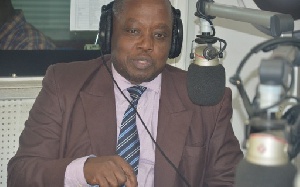Auditor General (A-G) Daniel Yaw Domelevo has identified procurement as one of the major means through which public servants siphon state funds.
According to him, during auditing, the Auditor-General’s Service often identifies a lot of leakages in the public sector through the procurement process.
Mr Domelevo disclosed this on the Association of Chartered Certified Accountants' Think Ahead segment of the Executive Breakfast Show (EBS) on Class91.3FM on Tuesday, 21 February.
“The main area of leakage is, number one, procurement. Procurement is a very terrible area,” he told show host Moro Awudu.
Mr Domelevo explained: “At times nothing has been bought but all the paper work is there to establish that we have built a school. A contract can be signed and there is documentation to show it has been built. The contract document which is produced to prove a genuine procurement is the same thing which is also produced to justify a fake or a non-existing procurement.
“Sometimes the vehicle is not there, it has not been bought but you have a classmate who works with Toyota Ghana…who knows where some loose documents are so he goes and gets an invoice and a receipt book so he gives you an invoice for the purchase of the car and also a receipt acknowledging payment of the money and you would come and file it in your books. So, when the auditors come, you would say ‘yes, we procured’. They can put adverts in the papers and say ‘this is the advert, these are the tender documents, the evaluation report and this is payment, so we bought it’. The next question is: where is the vehicle? And at times you don’t find the vehicle. So that is where there is the need for auditing,” Mr Domelevo explained.
He noted further: “Somebody comes in with a different eye to look at what you say you have done to say yes the money has been used for the intended purpose or the money was used for the intended purpose, but with disregard for value. At times it will surprise you to know that somebody goes to buy 1000 computers at a price higher than one computer in the shop and you ask what the logic in that is. If I’m buying one computer for GHS500, it suffices that if you are buying 1000 computers, you should get them at a lower price, but at times you find it the other way round. So that is where we can prove that you used the procurement process but not value for money.”
Mr Domelevo advised public servants to desist from such practices, wondering: “If it is money from your pocket will you have used it that way?”
Business News of Tuesday, 21 February 2017
Source: classfmonline.com
Procurement remains conduit for siphoning funds in Ghana - Auditor General
Entertainment












